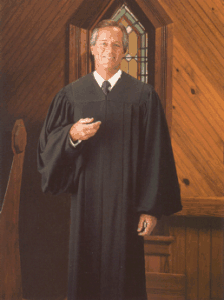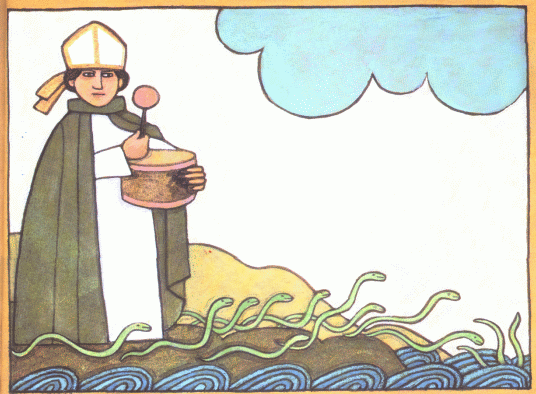The Common Service claims to be a version of the history liturgy of the Christian church and a revision of The Order of the Holy Communion from TLH. I began to notice the absence of rubrics (directions) and realized that in the Invocation there is no symbol of the cross to indicate that the sign of the cross may be made. It turned out that this was a sign of things to come. Though the cross symbol appears in the absolution, there is no direction to indicate what it means. As expected the word "catholic" was not present in either the Nicene Creed or the Apostles' Creed but it turns out it was omitted from the Athanasian Creed as well (where it was retained in TLH).
Unlike LSB which presumes that the full Eucharist is the norm (If there is no communion), CW presumes that this is ordinary (when there is no communion). Even more odd is the absence of the Our Father from the canon and its placement at the prayers. While I have always resisted the Lutheran innovation of the Our Father prior to the Verba, the connection between the Verba and the Our Father is most ancient and it represents a clear departure from catholic practice to omit the Our Father here.
It is not at all obvious that the pastor's portion of the liturgy could or should be chanted. In fact, it is pretty clear from the pew book that the expectation is that the pastor will NOT chant, that chanting is an exception and, perhaps, an unwelcome one. Even if the notes are in the pastor's book (or altar book), it certainly makes it appear that neither the publishers nor the folks in the pew expect the pastor to chant.
The sign of the cross is also conspicuously absent with respect to the morning and evening prayers of Luther and his bidding to make the sign of the cross at the invocation and how to pray.
One subtle hint lies in the fact that the clerical collar is a rarity among Wisconsin Evangelical Lutheran Synod clergy. What you wear is not the primary thing but what you refuse to wear just may hint at your bias. All of this combined with the legendary affection WELS has with the Geneva Gown instead of the historic vesture of the pastor, leaves me with but one conclusion. Perhaps those former and current WELS complainers are absolutely correct. WELS does have a liturgical style and it is decidedly low church, a race to the bottom of the liturgical ladder, if you will, in which ceremony, vestments, and catholic tradition are suspect and unwelcome in the parishes of this church body.
How sad it is that a Lutheran body once captive to the liberal view could recapture its more orthodox theological underpinnings and then eschew the liturgical shape of that orthodox doctrine on Sunday morning. It remains a problem for more the WELS. Even in Missouri we have many who would find Luther's liturgical practice too shockingly katholisch to be tolerated in a Lutheran parish today. How strange it is that some Lutherans today would be uncomfortable with the Lutheran praxis of Martin Luther, the second Martin (Chemnitz), the orthodox Lutheran fathers, or our most famous church musician, J. S. Bach!!
Addendum from Fr. Hollywood in 2009 RE Wisconsin Synod practice:
According to this Q&A from the WELS's own website, there have been at least two instances where laywomen in the WELS have said the Lord' Words of Institution over bread and wine and served it, claiming that it was the body and blood of the Lord. The practice was in no way condemned by the WELS hierarchy, but rather, the practice is current under a "moratorium" in order to "keep from offending our brothers."
This error has come about by the intersection of an error on the doctrine of the ministry combined with a legalistic view of the role of women.
First, WELS does not believe the pastoral office has been divinely established, and further teaches that "The Bible establishes all of public gospel ministry but does not establish a pastoral office as such or vest certain duties exclusive to that office" (Emphasis added).
From this starting point, WELS adds the next premise that the differences between male and female are limited to a legalistic "thou shalt not," as the article puts it:
"Since the Bible does not assign specific duties to the pastor, WELS approaches the matter of women communing women from Scripture's man and women role relationship principle. WELS doctrinal statements on the role of man and woman say that a woman may have any part in public ministry that does not assume teaching authority over a man. That, of course, would include women communing women" (emphasis added).And this has moved beyond the theoretical into the practical: "WELS has had only two instances of women communing women, and our Conference of Presidents has since issued an indefinite moratorium on such practice to keep from offending our brothers until the matter is mutually resolved" (emphasis added).
My Comments:
As you can tell from the Q & A quoted from the WELS website, our Lutheran kin are in a race to the bottom in other ways as well -- functional understanding of the office of pastor and the distinction of that office and its functions to prevent women from serving ONLY when it places them in authority over men. Odd, yes! Lutheran, no!





















